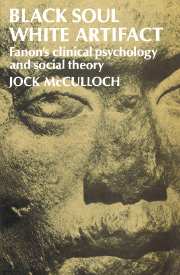Book contents
- Frontmatter
- Contents
- List of abbreviations
- Introduction
- Chapter 1 The three paradigms: negritude, ethnopsychiatry and African socialism
- Chapter 2 Negritude
- Chapter 3 Ethnopsychiatry and the psychopathology of colonialism: Fanon's account of colonised man in ‘Black Skin White Masks’
- Chapter 4 From psychiatric practice to political theory
- Chapter 5 Culture and personality
- Chapter 6 Class conflict and the liberation of Africa
- Chapter 7 The failed revolution
- Chapter 8 The neo-colonial state
- Chapter 9 Towards a critique of Fanon's class analysis
- Chapter 10 Conclusion
- Appendix I Fanon and Mannoni: conflicting psychologies of colonialism
- Appendix II Mental health in Algeria
- Notes
- Select Bibliography
- Index
Chapter 7 - The failed revolution
Published online by Cambridge University Press: 07 October 2009
- Frontmatter
- Contents
- List of abbreviations
- Introduction
- Chapter 1 The three paradigms: negritude, ethnopsychiatry and African socialism
- Chapter 2 Negritude
- Chapter 3 Ethnopsychiatry and the psychopathology of colonialism: Fanon's account of colonised man in ‘Black Skin White Masks’
- Chapter 4 From psychiatric practice to political theory
- Chapter 5 Culture and personality
- Chapter 6 Class conflict and the liberation of Africa
- Chapter 7 The failed revolution
- Chapter 8 The neo-colonial state
- Chapter 9 Towards a critique of Fanon's class analysis
- Chapter 10 Conclusion
- Appendix I Fanon and Mannoni: conflicting psychologies of colonialism
- Appendix II Mental health in Algeria
- Notes
- Select Bibliography
- Index
Summary
The forces of reaction
The petty bourgeoisie and the national bourgeoisie
Fanon begins his discussion of the petty and national bourgeoisie with an analysis of the problems inherent in transferring categories of social class drawn from European experience to African political systems. The bulk of his writings on the national middle class are devoted to its failure to duplicate the achievements of the European bourgeoisie. The African middle class is a pseudo-middle class, just as the African proletariat is a pseudo-proletariat.
Fanon sets out the terminological problems by recounting the differing evolutions of the African and European middle classes. In Europe, national unity was achieved at a point at which the bourgeoisie had risen to economic dominance (The Wretched, p. 75). Trade, science and commerce were monopolised by this class. The ascendant bourgeoisie was able to oversee the industrialisation of western Europe and the rapid development of economic infrastructure and transport. At this time all European states were at comparable levels of development so that none enjoyed a substantial advantage over the others (The Wretched, p. 75). But the situation in the underdeveloped world is quite the reverse. The new states of the post-war era lack basic infrastructure such as plant and communications; their populations are blighted by poverty and they all lack skilled personnel, such as doctors and administrators.
- Type
- Chapter
- Information
- Black Soul, White ArtifactFanon's Clinical Psychology and Social Theory, pp. 166 - 183Publisher: Cambridge University PressPrint publication year: 1983



